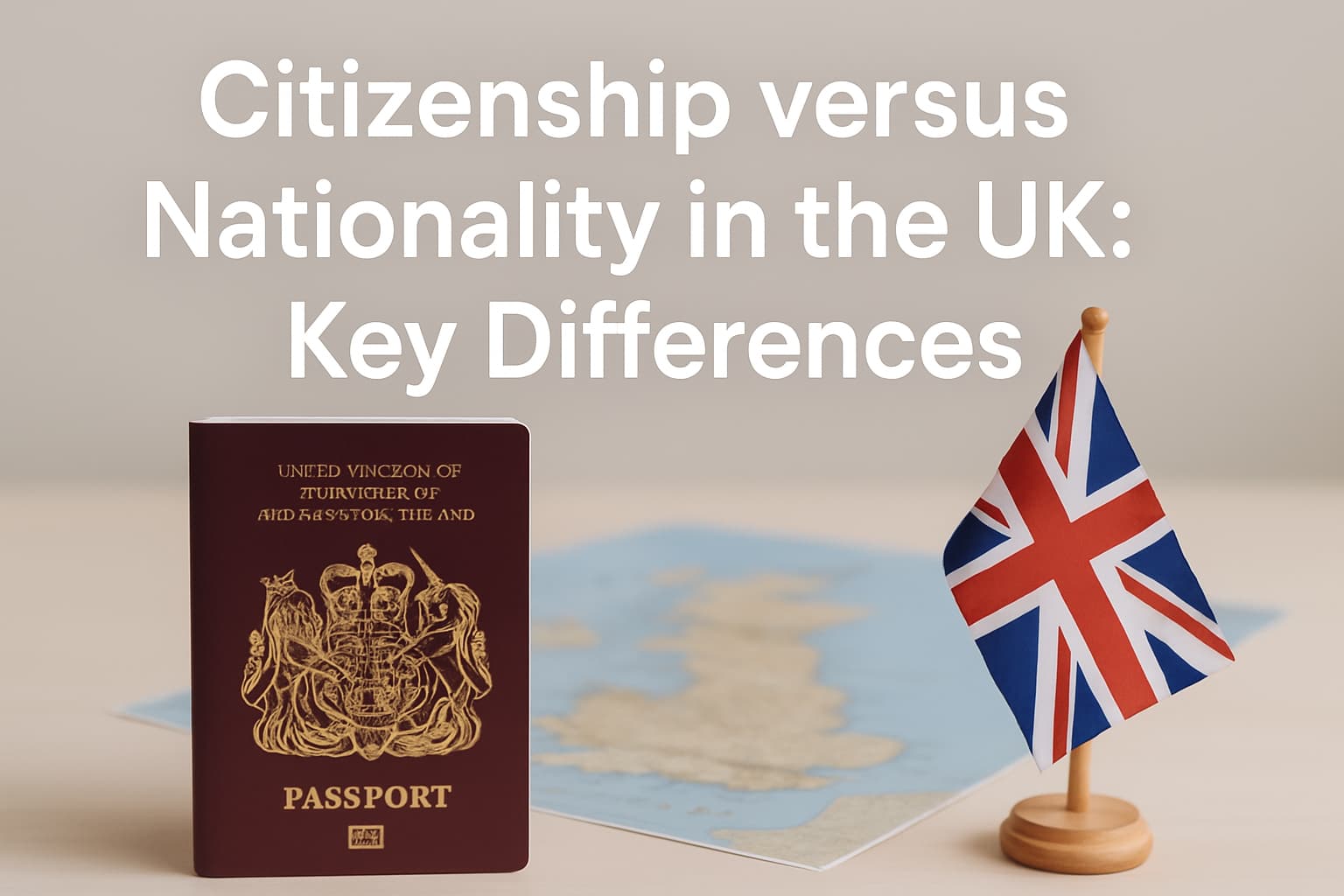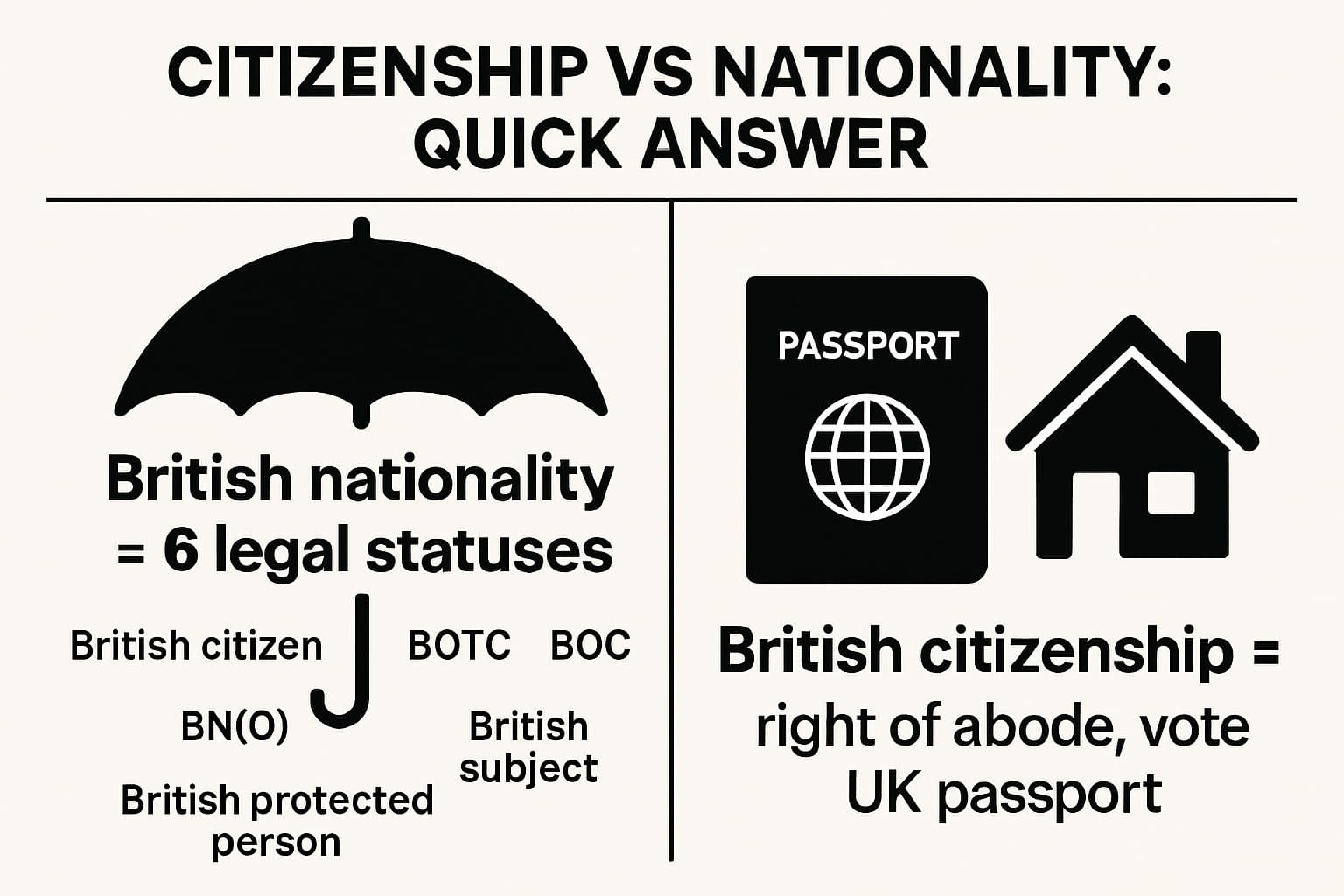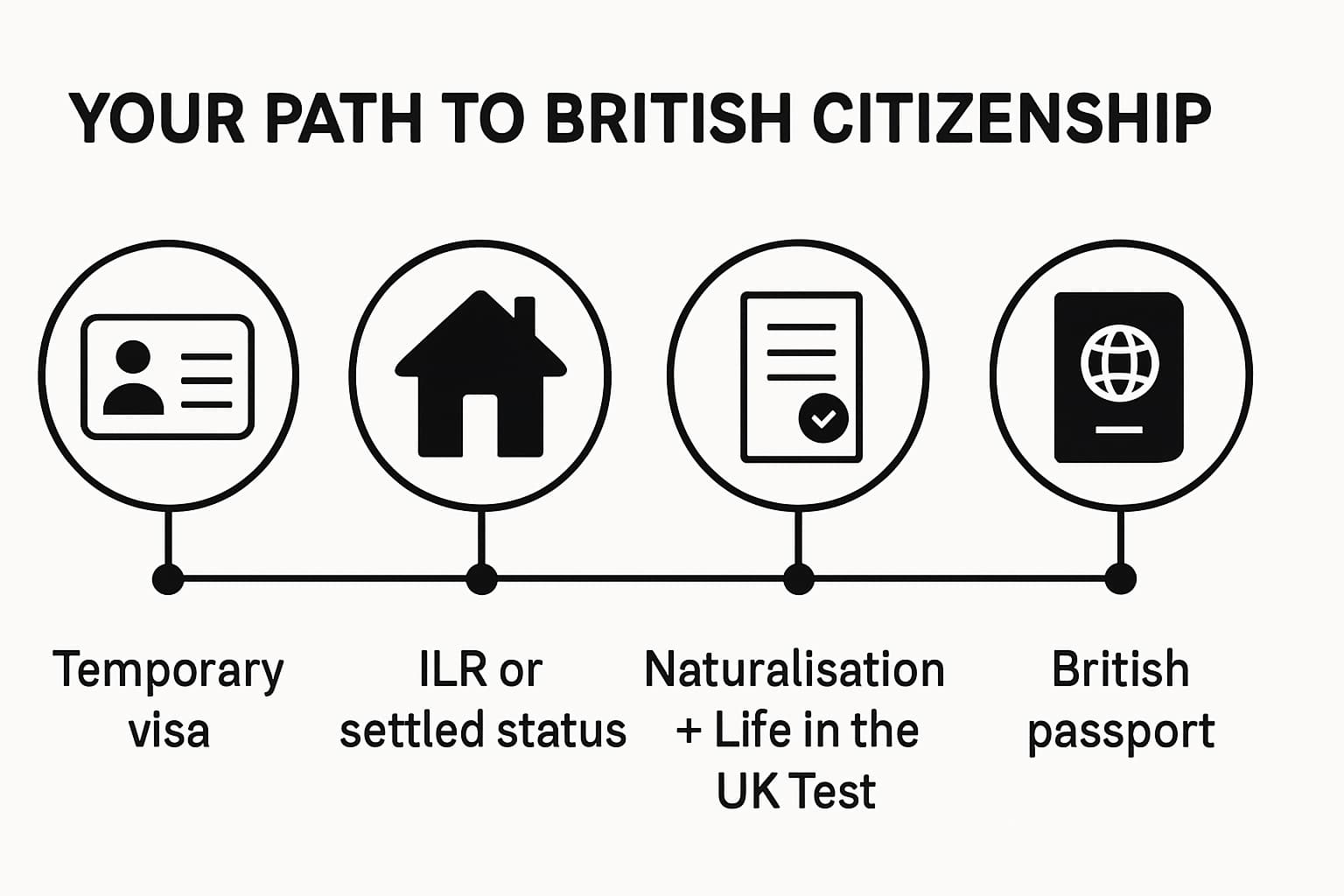Citizenship versus Nationality in the UK: Key Differences

Confused by citizenship versus nationality in the UK? You are not alone. The terms are used together on forms but mean different things in law, and the difference affects your rights, immigration options, and the Life in the UK Test.
This guide gives quick definitions, shows how the British Nationality Act 1981 structures status, explains what to write on UK forms, and maps your path from temporary visa to ILR and citizenship. You will also find practical proof tips, myth-busting, FAQs, and an easy way to pass the Life in the UK Test on your first try.
Citizenship versus nationality in the UK: the quick answer
British nationality is the umbrella legal status created by UK law. There are six types of British nationality. British citizenship is one specific type within that umbrella that carries the automatic right of abode in the UK.
- Nationality (UK context): A legal status under the British Nationality Act (BNA) 1981. Examples: British citizen, British Overseas Territories citizen.
- Citizenship: The class of British nationality that lets you live and work in the UK without immigration control, vote in UK elections, and hold a full British passport.
- Why it matters: On forms, “citizenship or nationality” usually means your legal nationality. For rights (vote, abode), the question is whether you are a British citizen.
For official definitions, see the British Nationality Act 1981 and the government’s guide to types of British nationality.

What each term means in British law (British Nationality Act 1981)
The BNA 1981 restructured UK nationality and tied the right of abode to British citizenship. In UK law:
- British nationality refers to any of the six legally defined statuses under the BNA 1981.
- British citizenship is the class that, by default, gives the right of abode and access to a full British passport.
Historical context from the Home Office explains how the BNA 1981 aligned nationality and the right of abode from 1 January 1983 (official background). Some people automatically became British citizens on 1 January 1983 if they were CUKCs with right of abode (automatic acquisition guidance).
The six types of British nationality at a glance
UK law recognises six categories. Within these, only British citizens automatically have right of abode in the UK (others may need visas or routes to citizenship). See Gov.uk: Types of British nationality.
| Status | Right of abode | Passport type | Notes |
|---|---|---|---|
| British citizen | Yes, automatic | British citizen passport | Can live and work in the UK without immigration control; vote in UK elections. |
| British Overseas Territories citizen (BOTC) | No (unless also a British citizen) | BOTC passport | Some BOTCs became British citizens on 21 May 2002 if linked to a qualifying territory (details). |
| British Overseas citizen (BOC) | No | BOC passport | Became BOC on 1 Jan 1983 if CUKC but not British citizen or BOTC (details). |
| British National (Overseas) [BN(O)] | No | BN(O) passport | Linked to Hong Kong; registration available before 1 July 1997 (details). |
| British subject | No | British subject passport | Historic status, rare; still recognised (details). |
| British protected person | No | British protected person passport | Very limited rights in the UK; not a citizen. |
Note: Some non-British Commonwealth citizens may have right of abode under the Immigration Act 1971, but that is not a British nationality in itself.
What British citizenship gives you (core rights and duties)
- Right of abode and freedom from immigration control in the UK (official overview).
- Live and work anywhere in the UK without a visa.
- Vote in UK parliamentary and local elections (if registered and eligible) and stand for office unless disqualified by law.
- British passport eligibility and consular assistance abroad.
- Jury service obligations and allegiance to the Crown.
What other British national statuses do not include
- Most non-citizen British nationals do not have right of abode in the UK.
- To live or work in the UK, they may need immigration permission (visa) or a route to register or naturalise as a British citizen, depending on circumstances.
- Holding a BOTC/BN(O)/BOC/Subject/BPP passport is not the same as British citizenship for UK residence.
Where “citizenship or nationality” appears on UK forms
On UK forms, the field usually reads “citizenship or nationality,” “country of nationality,” or just “nationality.” In practice this asks for your legal nationality under UK or another country’s law.
Typical UK examples:
- UK passport application: The nationality printed in a British passport will be the specific status, e.g., “British citizen” or “British Overseas Territories Citizen”.
- Home Office visa/immigration forms: “Country of nationality” is your current nationality (e.g., India, Nigeria). If you are British, enter the relevant British status.
- HMRC/tax forms: “Nationality” means your legal nationality. If dual, list all where asked.
Passports, visa forms and HMRC: what to tick and write
- Applying for a British passport: If you are a British citizen, your nationality will be “British citizen.” For other British statuses, the passport will state that status (e.g., BN(O)).
- Applying for a UK visa: If you are not British, enter the country that issued your passport (your non-UK nationality). If you hold a British status that does not give right of abode, you may still need a visa.
- HMRC: If the form allows only one nationality but you hold more than one, follow the form guidance (many online services let you add multiple).
Dual nationality: declaring multiple nationalities correctly
The UK allows dual nationality. You can be a British citizen and a citizen of another country (Gov.uk: Dual citizenship).
- On forms: If asked, list all nationalities you hold. If space is limited, follow the specific form instructions or attach a note where permitted.
- Travel: Use your British passport to enter and leave the UK if you are a British citizen; use your other passport where it gives you visa-free entry abroad.
- Check the other country’s rules: Some countries restrict or do not recognise dual nationality even though the UK allows it.
Real-life scenarios to tell them apart
These examples show how citizenship and nationality differ in day-to-day UK situations.
Passport vs immigration status (ILR, settled status)
- British passport = British nationality proof: A valid British citizen passport is strong evidence of British citizenship for most purposes.
- ILR or EU settled status: These are immigration statuses, not nationality. You are still the national of your current country unless and until you naturalise as British.
- Right to work checks: A British passport satisfies right-to-work. ILR requires a share code or BRP, not a British passport.
Children born in the UK: when they become British citizens
- Not automatic for everyone: UK birth alone does not guarantee British citizenship (Gov.uk overview).
- Automatic at birth: If at least one parent is a British citizen or settled (e.g., ILR) at the time of birth.
- Registration later: If not British at birth, a child may register when a parent becomes British or settled before age 18 (various sections), or under the 10-year rule in section 1(4) BNA 1981 if they lived in the UK for the first 10 years of life (policy guidance).
How it affects your UK immigration journey
Understanding citizenship versus nationality helps you plan the route from temporary permission to ILR and then to naturalisation as a British citizen.
From ILR to naturalisation: timing and criteria
- Hold ILR/PR/settled status for the required time. Common routes: 12 months on ILR before applying under section 6(1) (5-year residence route) or immediately after ILR if married to a British citizen under section 6(2).
- Residence limits (illustrative): For the 3-year spouse route (s6(2)), absences must generally be no more than 270 days in 3 years and 90 days in the last 12 months (Home Office guidance). The 5-year route has different totals.
- Good character: Required by statute for naturalisation (good character requirement).
- Language and the Life in the UK Test: Most adult applicants must meet both.
- Fees and documents: Budget for the application fee and prepare evidence early.
Do you need the Life in the UK Test?
Most people applying for settlement (ILR) or naturalisation must pass the Life in the UK Test unless exempt (for example, under 18, over 65, or long-term medical condition). The test covers rights and responsibilities connected to British citizenship, UK history, and culture.
Ceremony, pledge and proof (briefly)
- Ceremony: After approval, you attend a citizenship ceremony and make a pledge of allegiance.
- Certificate: You receive a naturalisation (or registration) certificate.
- Passport: Use the certificate to apply for a British passport as proof of citizenship.

Proving citizenship and nationality in practice
Here are standard documents typically accepted to prove British citizenship versus other British national statuses.
Documents that prove British citizenship
- Current full British citizen passport (best single proof for most uses).
- Naturalisation or registration certificate plus matching photo ID.
- UK birth certificate with evidence a parent was British or settled when you were born (for births after 1982).
- Right of abode evidence where relevant to historic cases, or a Home Office status trace if records are needed.
Documents for other British nationals (non-citizens)
- BOTC/BN(O)/BOC/British subject/BPP passport issued for your specific status.
- Any Home Office letters or certificates confirming that status.
- Remember: these usually do not grant right of abode. You may still need UK immigration permission to live or work here.
Common myths about citizenship and nationality
Nationality is not ethnicity or regional identity
On legal forms, “nationality” is a legal status, not ethnicity or cultural identity. You might identify as English, Scottish, Welsh, or Northern Irish, but your legal nationality on forms is typically British (with the precise status, e.g., British citizen).
UK, Great Britain, and British: which term is correct?
- United Kingdom is the country: United Kingdom of Great Britain and Northern Ireland.
- Great Britain is the island (England, Scotland, Wales) — not the same as the UK.
- British is the correct adjective for nationality recorded in UK documents (e.g., British citizen).
FAQs: quick answers
Is nationality the same as citizenship on UK forms?
Forms usually ask for “citizenship or nationality” to capture your legal nationality. In UK law, citizenship is one type of British nationality that confers right of abode.
Can you be a British national but not a British citizen?
Yes. Examples include BOTC, BN(O), BOC, British subject, and British protected person. These are British nationalities but do not automatically give right of abode.
Does a British passport prove citizenship?
A current British citizen passport is strong proof of citizenship. Other British passports (e.g., BN(O), BOTC) prove those statuses but not right of abode.
Do BOTCs/BN(O)s need visas to live in the UK?
Usually yes. Their status does not give right of abode. Some may use specific visa routes (e.g., BN(O) route) or seek registration/naturalisation where eligible.
Do I need the Life in the UK Test for ILR and citizenship?
Most adult applicants for settlement or naturalisation must pass it unless exempt due to age or long-term condition.
Can I hold dual British and another nationality?
Yes. Dual nationality is allowed in the UK, but check if your other country restricts dual status.
Pass the Life in the UK Test on your first try
Feeling overwhelmed by the handbook and worried about retests? The Life in the UK Test App helps you master rights and responsibilities content that underpins citizenship — fast.
Why this app works when textbooks don’t
- Mobile-optimised handbook content for quick, focused study on the go.
- Brit-Bear smart assistant guides you to weak areas so you do not waste time.
- Readiness score shows when you are genuinely exam-ready.
- 650+ questions with explanations and Hard Mode mocks to simulate the real test.
- Offline access so you can study anywhere, anytime.
Users report finishing their prep in days, not weeks, and avoiding costly retests by tracking their readiness before booking.
Start now: avoid retests and save time
- Download the app and take a 5-minute baseline quiz.
- Follow the Brit-Bear study path until your readiness score stays green.
- Attempt a few Hard Mode mocks, then book the test with confidence.
Next steps and trustworthy resources
Your action checklist
- Confirm your status: Identify your exact British nationality class (if any).
- Plan your route: Map visa steps to ILR, then naturalisation where eligible.
- Prepare evidence: Keep passports, BRP/share codes, certificates, and travel records.
- Book your test prep: Use the Life in the UK Test App until your readiness score is stable.
- Apply confidently: Double-check form fields for “citizenship or nationality” and disclose dual nationalities accurately.
Where to confirm complex cases
- Gov.uk: Types of British nationality
- British Nationality Act 1981
- Home Office historical background
- Naturalisation policy guidance
- British citizenship: overview
- National Archives: historical CUKC
Have an edge case (e.g., historic connections, changes of status, or complex residence)? Consider professional immigration advice to avoid costly delays.
Ready to move forward? Download the Life in the UK Test App or Get it on Google Play and start your study plan today.